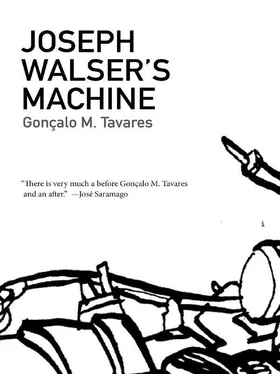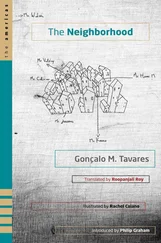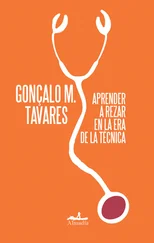The heart retreats from the rest of the body. Retreat , that is the essential word. A distance is traveled during a heart attack, a distance that is traveled internally: one of the organs marches in a direction opposite from the rest of the body. And that was what Walser felt when he was stimulated and engulfed in the operation of his machine, and the machine suddenly stopped; and it didn’t just stop for some unknown reason, some reason that would require inductive reasoning in order to comprehend, it simply stopped because it was twelve o’clock, and at twelve o’clock all the machines’ motors were switched off at the factory’s central offices.
Walser wasn’t going to die, this became apparent to him one second after each stoppage, but the immediate sensation, throughout his entire organism, irrational and inexplicable, was one of sadness. You could almost say that Walser’s entire organism became melancholic the moment that the machine’s motor stopped and he became conscious that, ultimately, there were two separate things at work there: himself and the machine. Two incompatible, separable things, two things that could retreat from each other. Yes, his melancholy derived from this obvious fact: he and the machine were two separate things that could retreat from each other. When the motor stopped Walser saw himself fully exposed in the world; he looked all around: everything could retreat from everything else.
During these breaks Walser sometimes did something that, if he were to be observed from start to finish, might lead people to classify him as insane: he would walk over to one of the work tables, which were set up against a wall, and pull on it, as if he wanted to measure the force necessary to separate one object from another, and, at the same time, to feel how easy it was to do it. The table was made of a hardwood, it was a heavy, compact table, with a number of tools on top; and Walser, instead of using the time while the motor was stopped to rest, and without any planning beforehand, instinctively walked over to the table and then strenuously pulled it away from the wall. He had been reprimanded many times for this useless and slightly irritating act, but it was clear that a table being pulled a few inches away from the wall wasn’t going to cause the ruin of the factory. It’s just that the act of pulling the table was absolutely unnecessary.
“My dear Walser,” Klober Muller always told him, “how many times have I told you that the table needs to remain against the wall? Do you hear me, my good sir?”
Joseph Walser’s expression of perfect concentration irritated Klober and the other workers, but at the same time it was clear that the act of pulling the table didn’t constitute an affront. It was unthinkable that Walser could commit an affront. This tiny disturbance, repeated many times over, was, for all that, completely undervalued by the managers of the factory, who considered it the natural product of a strange but basically sensible personality. Seen from the outside, the act of pulling the table was just a quirk.
On that day, Joseph Walser went back to his post after another short break at three o’clock, pressing his body against his machine to once again initiate the necessary movements. The motor began to run, as scheduled, at three ten. Walser’s chest rested vertically along a piece of metal that was slightly uncomfortable at its lower extremity, which was level with his stomach; each of his feet was in place on the appropriate pedal and began to fall into the rhythm that they would maintain, as usual, for an entire hour; his hands were already in their proper positions inside the machine and fit precisely into their little slots, which only allowed for the movements that were necessary for the operation of the machine. Yet Walser felt that the shirtsleeve on his left arm was caught, so started to move his other hand, letting go of its lever for a few seconds in order to resolve this unforeseen situation. Suddenly, his left hand slipped out from its place in the machine, and, quite distinct from the other noises in the factory, a colossal scream emerged from the mouth of the employee Joseph Walser.
Lying on the hospital bed, Joseph Walser watched the patient who, for the last few minutes, hadn’t stopped laughing. The man, a fat man, could barely move on top of his bed, and his chest shook with each peal of laughter. A nurse asked him to calm down.
Out in the hallway, incoherent sounds would at times come together to form a cluster that was intelligible, and in these moments there was a feeling that there was going to be an attack on the hospital. The sounds, however, quickly undid their structural unity, or so it seemed, and the shapeless incoherence returned, demonstrating that nothing had changed. Men emitting weak sounds were held up by men emitting voices that were still virile and healthy. The vibration of all the sounds and the way in which the words either resounded or fell flat allowed Walser to distinguish between health and illness, since he couldn’t manage to see anyone from his room, except for his fat roommate who finally stopped making such a racket.
Inside Walser’s body, his sensibility to sounds seemed to be turned up to maximum intensity, as if controlled by a switch. Any defects in the space in which he lay were consequences of the defects in the sounds surrounding him; if the sounds from the hallway and the other rooms bothered him, the quality of the whole environment seemed to deteriorate.
Short sounds were emitted by energetic nurses and doctors. An odd relationship had already become obvious: those who acted spoke very little, and when they did use words, they sounded ruthless, almost malicious. But the ones who gave the appearance of being unaffected by the suffering that could be heard all around were the ones who turned out to be the most useful: grabbing a pair of scissors, cutting bandages that had become uncomfortable, making quick notes in their notebooks, adjusting the position of the beds at the patients’ request, administering medication.
All of a sudden the central mass of sounds changed. A tremendous commotion seemed to be arising out of some similarly gigantic indecision about what movements should be made. Nurses and doctors raised their voices. All this foretold the arrival of something, and one or another person ran through the hallway, which marked a clear change in behavior. From the open door of his room, Walser could see the first stretcher pass by at great speed, a stretcher bearing a body with a significant wound. His first impulse was to raise his torso up off his bed so he would be in a better position to see. But he could still only see very little.
The sounds continued, and Walser had the strange feeling that his eyes, at that moment, were jealous of his ears, since there was such an enormous amount of material for his ears to interpret. He was on the verge, absurd as it was, of yelling: “I want to see!” But he didn’t say anything, out of shyness.
The sound of accelerated footsteps on the floor became essential. Walser immediately thought of his brown shoes, his irresponsible shoes, as his boss Klober had put it. The sound that he now heard from the hallways, however, couldn’t be from irresponsible shoes. “Something’s happened,” he murmured. There was great gravity in the sound of those fast-moving shoes.
Meanwhile, his roommate was also trying to discern what was going on. His completely uncontrolled and unjustified bursts of laughter had come to such a natural end that Walser hadn’t even noticed the difference. It was clear that something important was happening. More stretchers had passed by, and Walser had seen a number of uniformed bodies lying on them. Certain sounds stuck out as having been individual words amid all the tumult, in which other sounds seemed both neutral and unintelligible; these words took on a personality, as if, paradoxically, they were the only sounds weighty enough to remain afloat in the air after all the others had disappeared: “attack” and “bomb” could now be heard clearly.
Читать дальше












